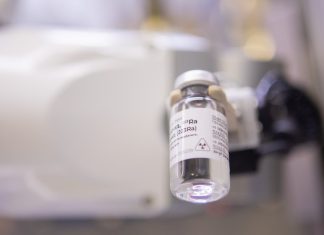Russian and Polish scientists have created a new drug for the treatment of lung cancer, according to the material published in the International Journal of Molecular Sciences. A team of scientists from the National Research University MIET and their Polish colleagues synthesized a drug based on cisplatin, it slows down and stops the growth of cancer cells without suppressing the vital activity of healthy cells.
According to the authors of the article, the new drug is simple in use. The drug is based on an organic complex.
“The development is based on organic ligand molecules, the active part of which are metal complexes such as copper, zinc and cadmium. We have enhanced their properties due to the physical deposition of silver nanoparticles. The analysis showed that complexes with cadmium exhibit the greatest antitumor activity,” Izvestia quotes Sergey Dubkov, associate professor at the Institute of Advanced Materials and Technologies of the NRU MIET, as saying.
Silver nanoparticles help the agent penetrate the membrane of a cancer cell and accumulate in its internal parts, destroying it from the inside. These particles lead to increased action of the complex against almost all elements of the cell, including mitochondria, nucleus and endoplasmic network, Dubkov explained.
It is assumed that the new drug will detect cancer cells by using smart drug delivery systems based on the so-called targeted molecules. Now the research team is working on the reinforcement of the antitumor properties of the new compound. The drug is being developed under Priority-2030, a state program established by the Ministry of Education and Science.
According to the World Health Organization (WHO), lung cancer is the most common type of cancer in men today (in women, the most common type is breast cancer). In 2020, 2.21 million cases of the disease were detected in the world; 1.8 million patients with the diagnosis died (including about 27,000 in Russia). In Russia, more than 62,000 new cases of the disease are registered annually, including only 30% in the early stages.




